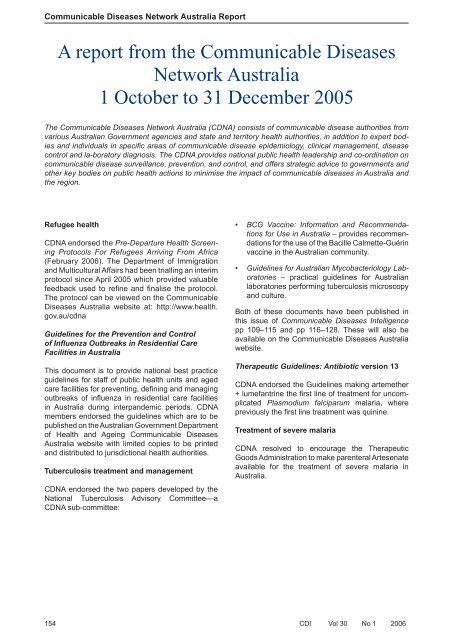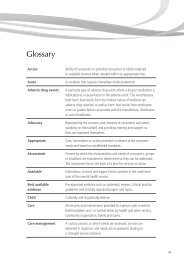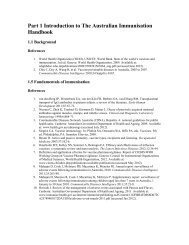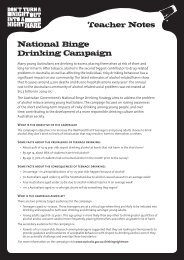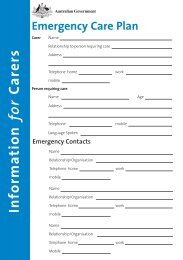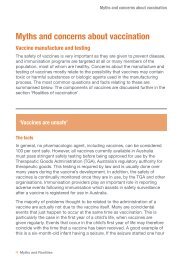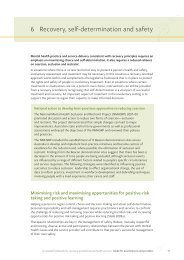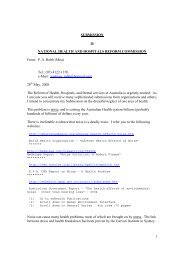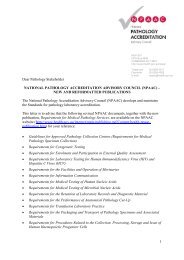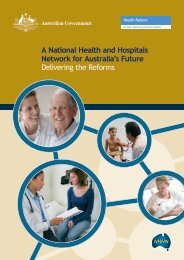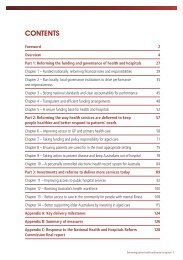PDF file - Department of Health and Ageing
PDF file - Department of Health and Ageing
PDF file - Department of Health and Ageing
Create successful ePaper yourself
Turn your PDF publications into a flip-book with our unique Google optimized e-Paper software.
Communicable Diseases Network Australia Report<br />
A report from the Communicable Diseases<br />
Network Australia<br />
1 October to 31 December 2005<br />
The Communicable Diseases Network Australia (CDNA) consists <strong>of</strong> communicable disease authorities from<br />
various Australian Government agencies <strong>and</strong> state <strong>and</strong> territory health authorities, in addition to expert bodies<br />
<strong>and</strong> individuals in specifi c areas <strong>of</strong> communicable disease epidemiology, clinical management, disease<br />
control <strong>and</strong> la-boratory diagnosis. The CDNA provides national public health leadership <strong>and</strong> co-ordination on<br />
communicable disease surveillance, prevention, <strong>and</strong> control, <strong>and</strong> <strong>of</strong>fers strategic advice to governments <strong>and</strong><br />
other key bodies on public health actions to minimise the impact <strong>of</strong> communicable diseases in Australia <strong>and</strong><br />
the region.<br />
Refugee health<br />
CDNA endorsed the Pre-Departure <strong>Health</strong> Screening<br />
Protocols For Refugees Arriving From Africa<br />
(February 2006). The <strong>Department</strong> <strong>of</strong> Immigration<br />
<strong>and</strong> Multicultural Affairs had been trialling an interim<br />
protocol since April 2005 which provided valuable<br />
feedback used to refi ne <strong>and</strong> fi nalise the protocol.<br />
The protocol can be viewed on the Communicable<br />
Diseases Australia website at: http://www.health.<br />
gov.au/cdna<br />
Guidelines for the Prevention <strong>and</strong> Control<br />
<strong>of</strong> Influenza Outbreaks in Residential Care<br />
Facilities in Australia<br />
This document is to provide national best practice<br />
guidelines for staff <strong>of</strong> public health units <strong>and</strong> aged<br />
care facilities for preventing, defi ning <strong>and</strong> managing<br />
outbreaks <strong>of</strong> infl uenza in residential care facilities<br />
in Australia during interp<strong>and</strong>emic periods. CDNA<br />
members endorsed the guidelines which are to be<br />
published on the Australian Government <strong>Department</strong><br />
<strong>of</strong> <strong>Health</strong> <strong>and</strong> <strong>Ageing</strong> Communicable Diseases<br />
Australia website with limited copies to be printed<br />
<strong>and</strong> distributed to jurisdictional health authorities.<br />
Tuberculosis treatment <strong>and</strong> management<br />
CDNA endorsed the two papers developed by the<br />
National Tuberculosis Advisory Committee—a<br />
CDNA sub-committee:<br />
• BCG Vaccine: Information <strong>and</strong> Recommendations<br />
for Use in Australia – provides recommendations<br />
for the use <strong>of</strong> the Bacille Calmette-Guérin<br />
vaccine in the Australian community.<br />
• Guidelines for Australian Mycobacteriology Laboratories<br />
– practical guidelines for Australian<br />
laboratories performing tuberculosis microscopy<br />
<strong>and</strong> culture.<br />
Both <strong>of</strong> these documents have been published in<br />
this issue <strong>of</strong> Communicable Diseases Intelligence<br />
pp 109–115 <strong>and</strong> pp 116–128. These will also be<br />
available on the Communicable Diseases Australia<br />
website.<br />
Therapeutic Guidelines: Antibiotic version 13<br />
CDNA endorsed the Guidelines making artemether<br />
+ lumefantrine the fi rst line <strong>of</strong> treatment for uncomplicated<br />
Plasmodium falciparum malaria, where<br />
previously the fi rst line treatment was quinine.<br />
Treatment <strong>of</strong> severe malaria<br />
CDNA resolved to encourage the Therapeutic<br />
Goods Administration to make parenteral Artesenate<br />
available for the treatment <strong>of</strong> severe malaria in<br />
Australia.<br />
154 CDI Vol 30 No 1 2006


